- Home
- Elif Shafak
The Architect's Apprentice Page 4
The Architect's Apprentice Read online
Page 4
Jahan glimpsed partly hidden female faces behind latticed windows, ornamented birdhouses on the walls, domes that caught the last rays of sun and lots of trees – chestnut, linden, quince. Wherever he turned he saw seagulls and cats, the two animals that were given free rein. Perky and pert, the seagulls soared in circles, diving to peck at the bait in a fisherman’s bucket, or the fried liver on a street vendor’s tray, or the pie left to cool on a windowsill. Nobody seemed to mind. Even when they chased away the birds, they did so reluctantly, making a show of it.
Jahan learned that the city had twenty-four gates and was composed of three towns: Istanbul, Galata and Scutari. He observed that people were attired in different colours, though according to what rule, he could not fathom. There were water-carriers with dainty china cups and pedlars hawking everything from musk to dried mackerel. Here and there he spotted a tiny wooden shack where they sold drinks in earthenware cups. ‘Sherbet,’ said the official, smacking his lips, but Jahan had no clue what it tasted like.
As they drove along, the official pointed things out: This cove is Georgian, that one Armenian. The scrawny figure over there is a dervish, the one beside him a dragoman. This man, a wearer of green, is an imam, for only they can put on the colour favoured by the Prophet. See the baker around the corner, he is Greek. They make the best bread, those infidels, but don’t you dare eat any, they draw the sign of the cross on every loaf. One bite and you’ll turn into one of them. This shopowner is Jewish. He sells chickens but can’t kill the birds himself and pays a rabbi to do that. That fella with sheepskin over his shoulders and rings in his pierced ears is a Torlak – a holy soul, some say, a sluggard if you ask me. Look at those Janissaries over there! They are not allowed to grow beards, only moustaches.
The Muslims wore turbans; Jews had red hats; and Christians, black hats. Arabs, Kurds, Nestorians, Circassians, Kazakhs, Tatars, Albanians, Bulgarians, Greeks, Abkhazs, Pomaks … they walked separate paths while their shadows met and mingled in knots.
‘There are seventy-two and a half tribes,’ the official said; ‘each has its place. As long as everyone knows their limits we live in peace.’
‘Who are the half?’ Jahan asked.
‘Oh, the Gypsies. No one trusts them. They are forbidden to ride horses, only donkeys. They are not allowed to breed but they multiply anyhow, they got no shame. Stay away from the whole cursed bunch of these stinking heathens!’
Nodding, Jahan decided to steer clear of anyone who looked like a Gypsy. Gradually, the houses became sparse, the trees grew taller, and the din subsided.
‘I ought to make the elephant ready before we present him to the Sultan,’ Jahan said eagerly. ‘A gift from the Indian Shah must look handsome.’
The man raised an eyebrow. ‘Don’t you know, lad? Your padishah is gone.’
‘What do you mean, effendi?’
‘Al-Sultan al-Azam Humayun … While you were on that ship, he lost his throne. All he has left is a wife and a couple of servants, we heard. He’s not a ruler any more.’
Jahan pursed his lips. What would happen to the elephant now that the king who had sent him was king no more? He had no doubt that should Sultan Suleiman ship the animal back he would die on board. Perturbed, he said, ‘Chota won’t survive another voyage.’
‘Don’t fret. They won’t return him,’ said the official. ‘We’ve all sorts of beasts in the palace, but never had a white elephant before.’
‘Do you think they’ll like him?’
‘The Sultan won’t be bothered. He’s got important tasks. But the Sultana …’
The official lapsed into silence. A haunting look came over his face as he stared hard and long at something in the distance. When Jahan followed his gaze, he saw, looming high atop a promontory, the outline of a huge building, its torches twinkling in the dark and its gates closed like lips guarding secrets.
‘Is this the palace?’ Jahan whispered.
‘This is it,’ said the man proudly, as if the place belonged to his father. ‘You are now in the abode of the Lord of East and West.’
Jahan’s face lit up with expectation. Every chamber under its roof must abound with silks and brocades, he thought. Every hall must echo with joyous laughter. The Sultana’s diamonds must be so large that each has a name prettier than that of a concubine.
They reached the Imperial Gate, under the stern gaze of the guards, who showed no interest in Chota, as though they were used to seeing a white elephant every day. When the party arrived at the Middle Gate, which had conical towers on each side with flaming torches, they got down from the carriage. The wind shifted just then, carrying a putrid smell. It was in that instant that Jahan, on impulse, glanced up towards the shadows in the background. He froze as he caught sight of the gibbets. There were three of them. One short, two tall. Mounted on each was a severed head, silently rotting away; swollen, empurpled, the mouth stuffed with hay. The boy caught an almost imperceptible movement, the insatiable greed of maggots crawling inside human flesh.
‘Traitors …’ said the official under his breath and spat with force.
‘But what have they done wrong?’ asked Jahan, his voice frail.
‘Treachery, as likely as not. Either that or theft, I’d say. They had it coming, for sure. This is what happens to those who play false.’
Dazed, whey-faced, dwarfed by the columns ahead of him and suddenly bereft of words, Jahan trudged through the massive gate. Though he was gripped by an urgent desire to run away, he could not bring himself to leave the elephant. Like a convict trudging to the gallows, surrendering to a fate he could neither avoid nor accept, he followed the official and entered Sultan Suleiman’s palace.
All the boy glimpsed that night, as on the ensuing nights, were massive walls, a mammoth door with iron studs, a courtyard so vast it could have swallowed the world, and more walls. It occurred to him that you could live in a palace all your life but never see much of it.
They were taken to a barn with an earthen floor, thatched roof and lofty ceiling – Chota’s new home. Inside was a sullen, sinewy fellow of indeterminable age. He had magical fingers that healed animals, though they were of no use when it came to human diseases. His name was Taras the Siberian. Although there were no horses in sight, they could hear them shuffling about and neighing nearby, made nervous by their presence. Since time immemorial horses had disliked elephants, Taras said. It must have been an ill-founded equine fear, he added, since he had never heard of an elephant laying into a horse.
Taras examined Chota’s mouth, eyes, trunk, excrement. He glared at Jahan, clearly blaming him for the animal’s condition. The boy felt small, ashamed. They had been on the same ship, but Chota was on the brink of collapse while he was healthy as the crescent above.
Deftly, gingerly, the healer applied some foul-smelling ointment to Chota’s lumps, and wrapped his trunk with burlap full of crushed leaves and a fragrant resin that Jahan later on learned was called myrrh. Not knowing how to help, the boy brought a bucket of fresh water, which he placed next to the piles of shrubs, apples, cabbages and hay – a banquet after the awful grub in the ship. But Chota didn’t even look at them.
Jealousy gnawed at the boy’s heart. He was torn between wishing, with all his being, for this man to make the elephant better, and dreading that once back on his feet the animal would love the healer more than he loved him. Sultan Suleiman’s gift Chota might be, yet deep down Jahan saw him as his own.
Laden with such shabby thoughts, he was ushered outside. There, another man welcomed Jahan with a wide smile. An Indian by the name of Sangram, he was ecstatic to meet someone who spoke his mother tongue, and moved towards the boy the way a cat inches towards a stove, in need of warmth.
‘Khush Amdeed, yeh ab aapka rahaaish gah hai.’*
Jahan stared at him deadpan.
‘What’s the matter? Can’t understand what I’m saying?’ asked Sangram, now in Turkish.
‘Our words are different,’ said Jahan quickly. He told him
about the village he came from, so high in the mountains that they slept above the clouds, lodged between the earth and the firmament. He talked about his sisters and his late mother. His voice trembled slightly.
Sangram regarded him with a puzzled stare. He seemed about to say something grave. But then, brushing aside whatever had crossed his mind, he sighed and smiled again. ‘All right, let me take you to the shed. Meet the others.’
As Sangram explained the ways of the Ottomans, they strode down a path that snaked between the garden pavilions and towards a large pond where all kinds of fish splashed around. The boy had a slew of questions regarding life inside the palace, but each time he got a curt whisper by way of an answer. Still, he was able to pick up a few things. Though he had yet either to see or to hear them, he learned that there were lions, panthers, leopards, monkeys, giraffes, hyenas, flat-horned stags, foxes, ermines, lynxes, civets, dogs and wildcats, all within reach. Beneath the acacia trees to their right stood the cages of wild animals – the animals it was their responsibility to feed, clean, pacify and keep safe day and night. Recently a rhinoceros had arrived from Habesh but had not survived. When not in demand the beasts were sent to other menageries across the city, and their tamers along with them. The larger animals sojourned in the old Palace of the Porphyrogenitus. The imperial residence that once hosted the Byzantium nobility and those born to the purple was now home to the animals of the Sultan. Other creatures were kept in an ancient church near the Hagia Sophia. Chota would have probably been sent to the church, but, because he was still an infant and exceptionally white, it was decided to keep him at the seraglio for now.
Some of the caretakers originated from the four corners of the empire, others from unmapped islands. Those responsible for the birds and fowl dwelled in another lodging, south of the aviary. From dawn to dusk, gazelles, peacocks, roe deer and ostriches roamed in and out of the pavilions. The Sultan’s menagerie was a world unto itself. And, while full of ferocious creatures, it was, all in all, really no wilder than the city outside.
The wildlife in the palace came in two sorts: the feral and the ornamental. The former were here because of their savage nature; the latter because of their winsomeness. Just as leopards did not mix with nightingales, so their keepers did not rub elbows. The trainers of the fiercest animals were a separate bunch. Among the hundreds of slaves amid these walls, they were neither the highest paid nor the best fed, though they remained the most respected.
Jahan’s accommodation was to be a lean-to made of lumber and baked bricks. There were nine men inside. A hulk of a red-haired, red-moustached fellow who was in charge of the lions and was called Olev; a cross-eyed Egyptian giraffe-trainer by the nickname of Dara; an African crocodile-tamer who had scars all over his body and answered to the name of Kato; Chinese twins who took care of monkeys and apes and, as Jahan would soon find out, were addicted to hashish; a bear-trainer known as Mirka, who, with his broad shoulders and heavy legs, resembled a bit of a bear himself; two Circassian ostlers who attended to the thoroughbred horses; and the healer he had met earlier, Taras the Siberian. They greeted him with an irritated silence, surprised by his youth, exchanging glances, as if they understood something about him that he couldn’t grasp.
Sangram brought him a bowl of sutlach.* ‘Have some, it tastes of home,’ he said and added in a conspiratorial whisper, ‘Their food is not as good as ours. Better get used to it.’
Jahan wolfed down his dish while they all watched him with mute curiosity. His hunger was not sated but nothing else was offered and he didn’t ask. He changed into the garments they handed him. A pale shirt with wide sleeves, a fleece vest, a shalwar and, for his feet, soft leather boots. Afterwards he and Sangram took a stroll. The manservant popped a round, waxy substance into his mouth. Little did the boy know that it was a paste made of spices and opium. In a little while Sangram’s face softened, his tongue loosened. He told Jahan about Sultan Suleiman’s silence code. Although it did not apply as strictly in the first and second courtyards as in the third and fourth, everyone everywhere was expected to be quiet. Talking loudly, laughing or bellowing were forbidden.
‘What about singing? Chota likes to listen to lullabies before he goes to sleep.’
‘Singing …’ Sangram repeated, as if he were explaining something he himself did not quite comprehend. ‘Singing is allowed if done in silence.’
Having thus approached the garden walls, they stopped. There they found copses of tall firs, like soldiers standing guard, their branches forming a canopy.
‘Don’t go beyond this wall,’ said Sangram, his voice tight.
‘Why?’
‘Don’t question. Obey your elders.’
Jahan felt a lurch in his belly. His discomfort must have been apparent, for Sangram said, ‘Your face is all wrong.’
‘What?’
‘You’re pleased, it shows. You’re scared, there it is.’ He shook his head. ‘Women can’t hide their feelings because they’re weak. Lucky for them, they hide behind veils. But a man has to learn to mask his emotions.’
‘What should I do?’ asked Jahan.
‘Hide your face, seal your heart,’ said Sangram. ‘Otherwise it won’t be long before they make a hash of both.’
About an hour later, on his first night in Istanbul, Jahan lay stiff on a coarse pallet, listening to the sounds of the evening. An owl hooted nearby, dogs barked somewhere in the distance. Inside the shed it was no less noisy, his companions snoring, tossing, talking, farting, grinding their teeth in their sleep. One of them, though he couldn’t make out which, spoke in a language he had never heard before, if it was a language at all. His stomach joined the ruckus, rumbling. He reflected on food, particularly spicy meat pasties, but this always brought his mother to his mind, so he stopped. He rolled towards the window, stared up at a chink of sky. It was so unlike the blue yonder he had seen, day in and day out, on the ship. He thought he would never be able to sleep, but his weariness defeated him.
He woke up with a start, surfacing from dark, disturbed dreams. Somebody was breathing down his neck, rubbing himself against his haunches. A hand covered his mouth as another hand yanked at his shalwar. Jahan squirmed out of his grasp, but the man, being stronger, pushed him down and pressed him hard. The boy choked, unable to breathe. Only then did the man, realizing he was almost suffocating Jahan, move his hand aside. It was in that moment that Jahan sank his teeth, with all his might, into his assaulter’s thumb. A gasp of pain was heard. Sudden, galled. The boy jumped to his feet, shaking. In the powdery light from a candle stood the bear-tamer.
‘Come here,’ Mirka hissed.
Jahan understood from his tone that he didn’t want to be discovered. So he shouted, at the top of his voice, against every silence code, not giving a damn as to what would happen if the guards heard him. ‘You touch me again and my elephant will trample you! We’ll kill you!’
Mirka stood up, pulling his shalwar. Without so much as a glance at the other tamers, who were now awake, he strode to his pallet, muttering, ‘Your elephant is a baby.’
‘He’ll grow,’ howled Jahan.
The boy noticed that Olev was observing him with a mixture of affection and approval. The lion-tamer interjected from his corner: ‘Mirka, you sod! If you touch the Indian again, I’ll nail your balls to the wall, hear me?’
‘Curse you,’ said Mirka.
His heart hammering, the boy crawled into his bed, this time turning his back to the window, so as to keep an eye on the room. He understood that inside the palace he had to be vigilant at all times, even in sleep. He couldn’t stay here long. He had to find out fast which chamber the Sultan’s riches were kept in, fill his bags and leave. He would have to abandon the white elephant, he realized sadly. Chota was a royal creature; Jahan was not.
Little did he know that down in his barn Chota was also awake, listening, worrying. Somewhere in the heart of the inky night, so dense that it subjugated every other colour, he had picked up the scent of the o
nly animal that filled him with fear – the tiger.
No one could tell for sure how many souls resided within the palace walls. Taras the Siberian, who had been around longer than anyone could remember, said it was as many as the stars in the heavens, the hairs in a pilgrim’s beard, the secrets wafting in the lodos.* Others believed it was at least 4,000. At times Jahan caught himself staring at the gigantic gates separating them from the inner courtyards, wondering what kind of people lived on the other side.
He wasn’t the only one who burned with curiosity. Every animal-tamer that he knew prattled on in muted tones about the various residents of the palace – the head of halvah-makers, the master of ceremonies, the tasters who savoured each dish before it arrived at the sovereign’s table. Eager to find out more about them, the tamers gossiped in earnest, relishing every scrap of tittle-tattle, sweet as boiled sugar in their mouths. Above all, they were fascinated by the concubines and the odalisques. That they were invisible to all men, save the Sultan and the eunuchs, allowed the tamers to imagine them in any way they wished. In their minds they could paint freely the women’s faces, blank and promising like empty scrolls. One could never prattle on about the favourites of the Sultan, not even in whispers, unless it was the Sultana, whom everybody seemed to hate and felt justified in slandering.
They had heard plenty of tales about the harem, some real, most fanciful. Its gates were guarded by black eunuchs who had been castrated so badly that they could pass water only with the help of a tube they carried in their sashes. Since Islam forbade castration of any kind, Christian and Jewish dealers employed slave merchants to do the job elsewhere. Boys were captured from the deepest recesses of Africa and unmanned. Those who survived were bought by the palace and shipped to Istanbul. Of these many died during the voyage, their corpses dumped into the sea. If they were lucky and talented, they made their way up. Thus a sin for which no one took the blame, yet to which everyone contributed, lived on. Sangram said it wasn’t just their balls that had been removed but also, much too often, their hearts. The mercy that they had been denied in the past they now denied to all. If a concubine attempted to escape, it would be these eunuchs who would be the first to find her.

 Black Milk: On Writing, Motherhood, and the Harem Within
Black Milk: On Writing, Motherhood, and the Harem Within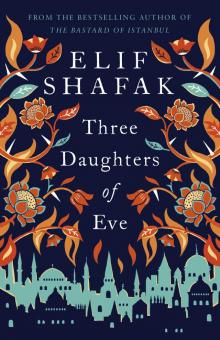 Three Daughters of Eve
Three Daughters of Eve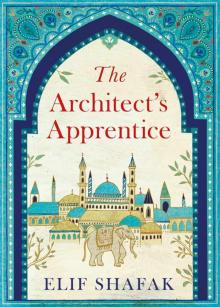 The Architect's Apprentice
The Architect's Apprentice The Gaze
The Gaze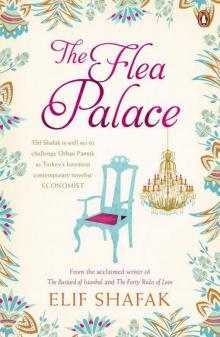 The Flea Palace
The Flea Palace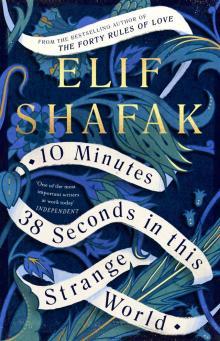 10 Minutes 38 Seconds in this Strange World
10 Minutes 38 Seconds in this Strange World The Forty Rules of Love
The Forty Rules of Love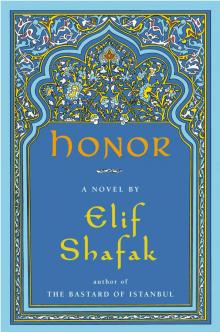 Honor
Honor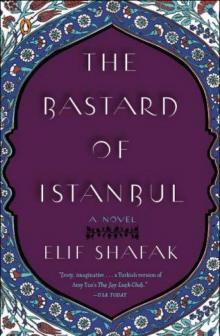 The Bastard of Istanbul
The Bastard of Istanbul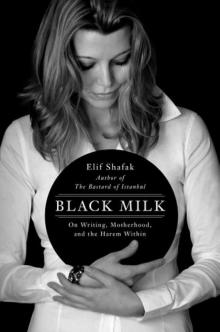 Black Milk
Black Milk The Happiness of Blond People (Penguin Specials)
The Happiness of Blond People (Penguin Specials)